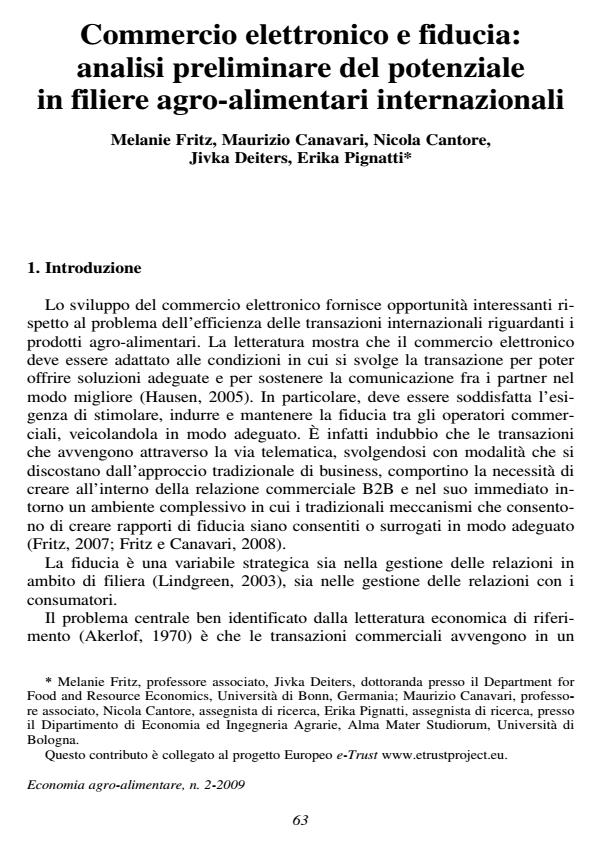Commercio elettronico e fiducia: analisi preliminare del potenziale in filiere agro-alimentari internazionali
Journal title ECONOMIA AGRO-ALIMENTARE
Author/s Melanie Fritz, Maurizio Canavari, Nicola Cantore, Jivka Deiters, Erika Pignatti
Publishing Year 2009 Issue 2009/2
Language Italian Pages 21 P. 63-83 File size 171 KB
DOI 10.3280/ECAG2009-002004
DOI is like a bar code for intellectual property: to have more infomation
click here
Below, you can see the article first page
If you want to buy this article in PDF format, you can do it, following the instructions to buy download credits

FrancoAngeli is member of Publishers International Linking Association, Inc (PILA), a not-for-profit association which run the CrossRef service enabling links to and from online scholarly content.
E-commerce for the dynamics of international agri-food chains: an adoption potential analysis - Business-to-business (B2B) e-commerce is an innovative use of information and communication technologies (ict) and refers to the exchange of goods and related information between companies supported by Internet-based tools such as electronic marketplaces (also called electronic trade platforms) or online shops. It provides opportunities for cost-efficiency in supply chain management processes and access to new markets. With regard to the food sector with its chain levels input - agriculture - industry - retail - consumer, B2B e-commerce would take place in the exchange of food products between all levels except retail to consumer (business-to-consumer ecommerce). B2B e-commerce demonstrated to be able to bring key advantages and potentials for European consumers and the European food sector, for instance easier traceability, cost-efficiency in supply chain management processes, better competitiveness, lower transaction costs, etc. In recent years, the availability of sophisticated B2B e-commerce technology improved tremendously and the applications became more powerful, flexible, and user-friendly. However, the "European e-Business Market Watch" initiative from the Directorate-General Enterprise and Industry from the European Commission showed that only large multinationals exploit the potentials of B2B e-commerce. smes instead, which create the largest share of turn over in the European food sector and therefore create jobs and welfare in Europe, are reluctant to take up existing B2B ecommerce technologies into their supply or selling operations. Trust issues were identified as one of the factors hindering adoption of this new technology among smes. In this paper, different food chain scenarios with their transaction processes and risks regarding food quality and food safety and related trust elements are analysed and differences in trust in several European food chains need to be considered within the context of the existing scientific literature. We identify food chains with trans- European cross-border exchange of food and international food chains in order to analyse the transaction processes and typical risks regarding food quality and food safety. The analysis focuses on trans-European cross-border and international food chains with their chain levels (e.g. production to wholesale trade, wholesale trade to industry, or wholesale trade to retail). In particular, it regards the food categories meat, grains, fresh vegetables, and fresh fruits and the particular risks regarding food quality and safety along the chains. The results are useful to identify relevant trust issues within the food supply chains, which can be addresses by innovative and trust building features of the B2B e-commerce tools.
JEL Codes: M15, M16
Key words: e-commerce, transaction risks, trust, trade stream analysis
- International Marketing Strategy Giovanna Pegan, Donata Vianelli, Patrizia de Luca, pp.149 (ISBN:978-3-030-33587-8)
Melanie Fritz, Maurizio Canavari, Nicola Cantore, Jivka Deiters, Erika Pignatti, Commercio elettronico e fiducia: analisi preliminare del potenziale in filiere agro-alimentari internazionali in "ECONOMIA AGRO-ALIMENTARE" 2/2009, pp 63-83, DOI: 10.3280/ECAG2009-002004